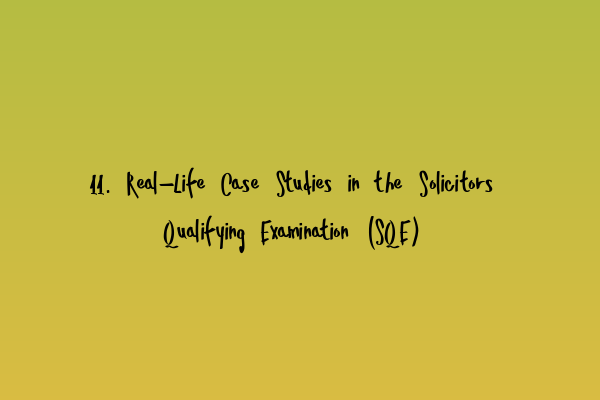11 Real-Life Case Studies in the Solicitors Qualifying Examination (SQE)
Are you preparing to take the Solicitors Qualifying Examination (SQE)? If so, you may be wondering what to expect on the upcoming exam. One important aspect of the SQE is the inclusion of real-life case studies, which test your ability to apply legal concepts to practical situations. In this blog post, we will explore 11 real-life case studies that are commonly tested in the SQE, giving you valuable insight into what you can expect and how to best prepare.
1. Contracts Case Study
The first case study focuses on contract law. You may be presented with a scenario involving a breach of contract, an agreement with minors, or an offer and acceptance dilemma. It is essential to understand the elements of a contract, the remedies for breach, and the principles of enforceability. Reviewing relevant case law and practicing contract-related questions will help you feel confident on exam day.
2. Criminal Law Case Study
Criminal law is another topic that frequently appears in the SQE. Your case study might involve analyzing the elements of a crime, assessing the credibility of witnesses, or applying the principles of self-defense. Familiarize yourself with the Criminal Justice System, offenses, and defenses, and be prepared to apply them to practical scenarios.
3. Family Law Case Study
Family law is often assessed through case studies in the SQE. You may encounter situations involving divorce, child custody, or domestic violence. Understanding the legal framework surrounding family law, including the Children Act 1989 and the Family Law Act 1996, is crucial. Practice applying these laws to realistic scenarios to ensure you can provide accurate advice.
4. Property Law Case Study
Property law is a fundamental topic in the SQE. Your case study may involve analyzing the different types of property ownership, assessing landlord and tenant disputes, or interpreting the Land Registration Act 2002. Familiarize yourself with the key principles of property law and practice applying them to various scenarios.
5. Tort Law Case Study
Tort law is another area that is commonly tested in the SQE. Your case study might involve negligence, occupier’s liability, or defamation. Understanding the elements of torts, the standard of care, and the defenses available is essential. Reviewing relevant case law and practicing tort-related questions will help you feel prepared on exam day.
6. Employment Law Case Study
Employment law is a crucial area for aspiring solicitors. Your case study may involve analyzing unfair dismissal claims, understanding the rights of employees, or advising on discrimination issues. Familiarize yourself with key employment legislation, such as the Equality Act 2010 and the Employment Rights Act 1996, and practice applying them to practical scenarios.
7. Company Law Case Study
Company law is an important topic that frequently appears in the SQE. Your case study may involve understanding the formation of companies, analyzing directors’ duties, or advising on shareholder disputes. Familiarizing yourself with the Companies Act 2006 and key principles of company law will ensure you can tackle these case studies with confidence.
8. Equity and Trusts Case Study
Equity and trusts is another area commonly tested in the SQE. Your case study may involve analyzing the creation of trusts, understanding fiduciary duties, or interpreting the concept of proprietary estoppel. Familiarize yourself with the principles of equity and trusts, including key cases such as Milroy v Lord and Rochdale v Rylands, and practice applying them to realistic scenarios.
9. Immigration Law Case Study
Immigration law is a niche area that may appear in the SQE. Your case study could involve analyzing the rights of individuals seeking asylum, understanding the requirements for visas, or advising on deportation issues. Familiarize yourself with the Immigration Act 1971 and other relevant legislation to ensure you are well-prepared for immigration-related case studies.
10. Intellectual Property Law Case Study
Intellectual property law is a growing field with significant relevance in today’s digital age. Your case study may involve analyzing trademarks, copyright infringement, or patent disputes. Understanding the key principles of intellectual property law and the relevant legislation, such as the Copyright, Designs and Patents Act 1988, is essential. Practice applying these principles to practical scenarios.
11. Professional Conduct Case Study
Professional conduct is a critical component of the SQE. Your case study may involve analyzing ethical dilemmas faced by solicitors, understanding the Solicitors Regulation Authority (SRA) Code of Conduct, or advising on conflicts of interest. Familiarize yourself with the SRA Handbook and the principles of professional conduct to confidently tackle these case studies.
Preparing for the SQE requires a comprehensive understanding of key legal concepts and the ability to apply them to real-life situations. By reviewing and practicing case studies across a range of topics, you can enhance your knowledge and develop the skills necessary to succeed in the exam.
If you’re looking for additional resources to help you prepare for the SQE, consider taking advantage of our SQE 1 Practice Exam Questions or our SQE 1 Practice Mocks FLK1 FLK2. We also offer comprehensive SQE 2 Preparation Courses and SQE 1 Preparation Courses tailored to your needs. Don’t forget to stay updated with the latest SRA SQE Exam Dates to ensure you’re well-prepared and ready to succeed on your path to becoming a qualified solicitor.
Good luck with your SQE preparation!
